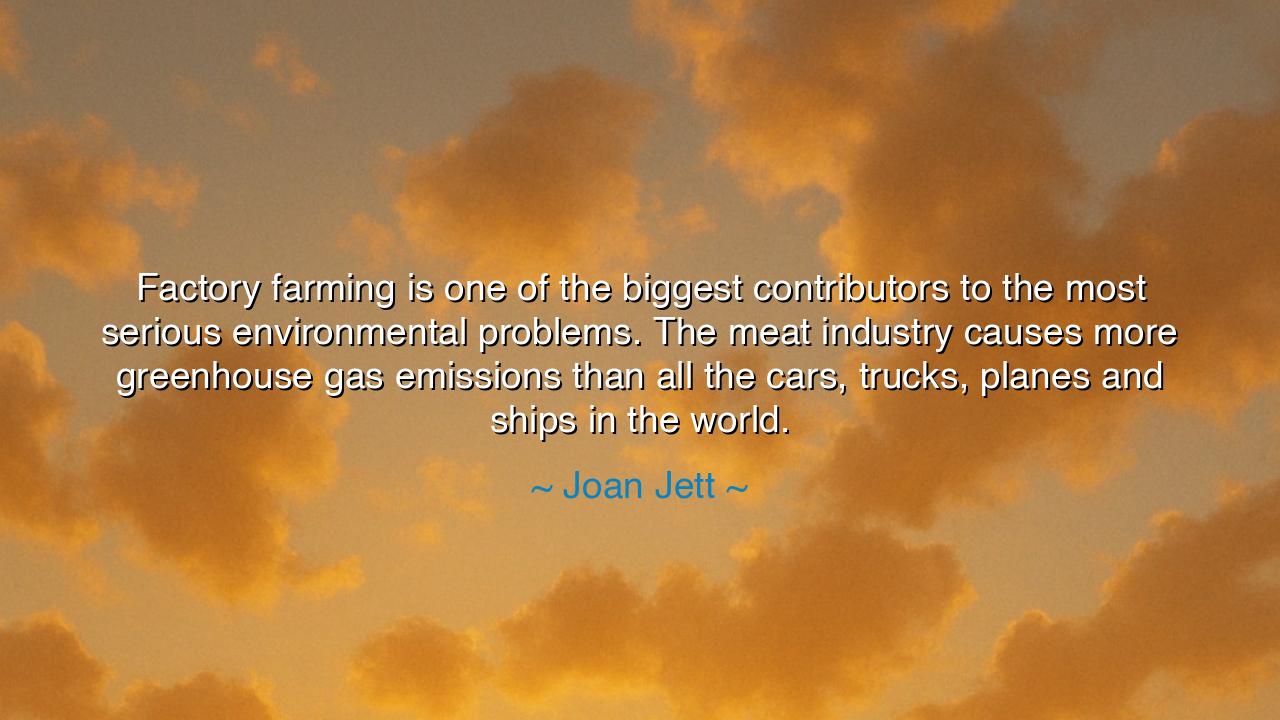
Factory farming is one of the biggest contributors to the most
Factory farming is one of the biggest contributors to the most serious environmental problems. The meat industry causes more greenhouse gas emissions than all the cars, trucks, planes and ships in the world.






In the annals of human ambition, few undertakings have shaped the world so profoundly as the cultivation of animals for food. Joan Jett’s observation strikes with both clarity and urgency: “Factory farming is one of the biggest contributors to the most serious environmental problems. The meat industry causes more greenhouse gas emissions than all the cars, trucks, planes and ships in the world.” Herein lies a warning as old as civilization itself: that unchecked exploitation, even for sustenance, carries consequences that ripple far beyond the farm, touching the sky, the waters, and the generations yet unborn.
The ancients often spoke of harmony between humans and nature. In the fertile plains of Mesopotamia, farmers learned that overtaxing the soil or rivers brought famine and hardship. Yet in later centuries, the drive for efficiency and profit transformed the raising of animals into vast, mechanized operations, displacing the rhythms of natural balance. Joan Jett’s words remind us that this modern practice, factory farming, is not a neutral pursuit; it is a force that shapes climates, rivers, and skies, and one whose effects are measured in storms, droughts, and the slow warming of the earth itself.
Consider the real-life consequences in the modern world. In the Amazon rainforest, forests fall each year to make way for cattle grazing and feed crop cultivation. These lands, once guardians of biodiversity and carbon sinks, are stripped bare, releasing greenhouse gases into the atmosphere and accelerating climate change. This story is not distant—it is the unfolding legacy of choices made in pursuit of cheap meat, illustrating Joan Jett’s warning: the meat industry, through its scale and methods, eclipses even the transportation sector in its contribution to global emissions.
The lesson is clear when we examine history. Societies that overexploited their natural resources—whether through deforestation, overfishing, or industrial agriculture—faced decline. The Maya civilization, whose forests were cleared for crops and cities, suffered ecological collapse that contributed to societal upheaval. Just as they learned too late, so too does the world today risk grave consequences if environmental stewardship is ignored. Factory farming, unchecked, threatens not only wildlife and forests but also the very stability of the climates on which humanity depends.
Yet, within this warning lies the possibility of transformation. The ancients understood that knowledge alone does not suffice; action must follow insight. Sustainable agriculture, regenerative livestock practices, and the adoption of plant-based diets in part can mitigate these harms. In the Netherlands and Denmark, innovative farming methods reduce emissions, recycle waste, and honor the natural cycles of soil and water. By aligning production with ecological balance, society demonstrates that economic needs and environmental responsibility need not conflict.
Joan Jett’s statement also carries a moral imperative. To witness the scale of greenhouse gas emissions produced by the meat industry is to be called to responsibility. Every choice we make—what we consume, how we support agriculture, how we advocate for policy—echoes through the atmosphere and across generations. Just as the ancients held kings and citizens accountable for stewardship of the land, so too must we consider our individual and collective roles in shaping the health of the planet.
Practically, this teaching invites deliberate action. One can reduce personal meat consumption, support sustainable and local farms, advocate for agricultural reform, and educate others on the climate impacts of industrial food production. Small choices, multiplied across millions, have the power to shift demand, transform industry, and reduce the environmental footprint of humanity. What seems an individual act becomes a movement capable of altering the course of history itself.
Thus, Joan Jett’s words echo across time: factory farming is not a mere matter of taste or tradition; it is a force with consequences that touch the sky, the forests, and the generations yet to come. To heed this truth is to honor the ancient wisdom that humans thrive only when they live in balance with the natural world. Let every meal, every choice, and every act of advocacy be a testament to foresight, courage, and responsibility, shaping a future where both people and planet flourish.
If you wish, I can also craft a more oral, poetic version, with dramatic cadences and rises and falls, making it feel like a timeless teaching from the ancients—ideal for narration or meditation. Do you want me to create that version?






AAdministratorAdministrator
Welcome, honored guests. Please leave a comment, we will respond soon